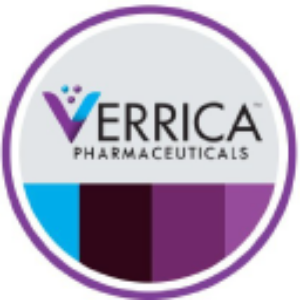Verrica Pharmaceuticals Announces Last Patient Dosed in Part 2 of Phase 2 Study of VP-315, a Potential First-in-Class Oncolytic Peptide-Based Immunotherapy, for the Treatment of Basal Cell Carcinoma
There are approximately 3-4 million diagnoses of basal cell carcinomas in the U.S. each year, with a high unmet need for new treatment options
Company reiterates lesion clearance data from Part 2 of Phase 2 expected in Q2 2024
WEST CHESTER, Pa., Jan. 05, 2024 (GLOBE NEWSWIRE) -- Verrica Pharmaceuticals Inc. (“Verrica”) (Nasdaq: VRCA), a dermatology therapeutics company developing medications for skin diseases requiring medical interventions, today announced that the last patient has been dosed in Part 2 of the Company’s Phase 2 trial of VP-315, a potential first-in-class oncolytic peptide, for the treatment of basal cell carcinoma.
“We are pleased to announce that Part 2 of our Phase 2 clinical trial of VP-315 for the treatment of basal cell carcinoma has been fully enrolled and the last patient has been dosed,” said Ted White, Verrica’s President and Chief Executive Officer. “Basal cell carcinoma is the most common form of skin cancer in the U.S. each year and patients are in need of alternative solutions to surgery which can cause pain, infection and scarring. Verrica’s VP-315 program is designed to provide for the targeted delivery of an oncolytic peptide engineered to stimulate the patient’s immune system and destroy cancer cells. Our study remains on track, and we look forward to sharing the data from our Phase 2 clinical trial later this year.”
About the Phase 2 Trial of VP-315
The Phase 2 trial is a 2-part, open-label, multicenter, dose-escalation, proof-of-concept study with a safety run-in designed to assess the safety, pharmacokinetics, and efficacy of VP-315 when administered intratumorally to adults with biopsy-proven basal cell carcinoma. The study is expected to enroll approximately 80 adult subjects with a histological diagnosis of basal cell carcinoma in at least one eligible target lesion. For additional information about this clinical trial, please visit clinicaltrials.gov, identifier NCT05188729.
About VP- 315
VP-315 is a potential first-in-class oncolytic peptide immunotherapy administered directly into a tumor to induce immunogenic cell death, which may offer a non-surgical option for patients suffering from skin cancer. The technology is based on pioneering research in “host defense peptides” – nature’s first line of defense towards foreign pathogens. VP-315 is a chemotherapeutic administered intratumorally and works by inducing lysis of intracellular organelles of tumor cells such as mitochondria, thereby unleashing a broad spectrum of tumor antigens for T cell responses. Verrica has an exclusive worldwide license to develop and commercialize VP-315 for dermatologic oncology indications, including non-metastatic melanoma and non-metastatic merkel cell carcinoma, and intends to focus initially on basal cell and squamous cell carcinomas as the lead indications for development. VP-315 has demonstrated positive tumor-specific immune cell responses in multi-indication Phase 1/2 oncology trials. The timing of any future clinical trials of VP-315, if any, will be determined after the conclusion of the current Phase 2 trial for basal cell carcinoma.
About Basal Cell Carcinoma
Basal cell carcinoma is the most common form of cancer in the U.S., and incidence is rising worldwide. There are approximately 3-4 million diagnoses of basal cell carcinomas in the U.S. each year, with a high unmet need for new treatment options. Basal cell carcinoma is generally treated with invasive surgery to remove the tumor, which can cause pain, infection, bleeding and scarring.
Forward-Looking Statement
Any statements contained in this press release that do not describe historical facts may constitute forward-looking statements as that term is defined in the Private Securities Litigation Reform Act of 1995. These statements may be identified by words such as “believe,” “expect,” “may,” “plan,” “potential,” “will,” and similar expressions, and are based on Verrica’s current beliefs and expectations. These forward-looking statements include the Company’s expectations with regard to the clinical development and potential benefits of VP-315, including the results of the Phase 2 clinical trial, the expansion of the VP-315 program into squamous cell carcinoma, the potential of VP-315 to be first-in-class, and the initiation of any future trials or clinical programs for VP-315, including a Phase 3 trial. These statements involve risks and uncertainties that could cause actual results to differ materially from those reflected in such statements. Risks and uncertainties that may cause actual results to differ materially include uncertainties inherent in the drug development process and the regulatory approval process, Verrica’s reliance on third parties over which it may not always have full control, and other risks and uncertainties that are described in Verrica’s Annual Report on Form 10-K for the year ended December 31, 2022, Verrica’s Quarterly Report on Form 10-Q for the quarter ended September 30, 2023, and other filings Verrica makes with the U.S. Securities and Exchange Commission. Any forward-looking statements speak only as of the date of this press release and are based on information available to Verrica as of the date of this release, and Verrica assumes no obligation to, and does not intend to, update any forward-looking statements, whether as a result of new information, future events or otherwise.
FOR MORE INFORMATION, PLEASE CONTACT:
Investors:
Terry Kohler
Chief Financial Officer
tkohler@verrica.com
Kevin Gardner
LifeSci Advisors
kgardner@lifesciadvisors.com
Chris Calabrese
LifeSci Advisors
ccalabrese@lifesciadvisors.com








